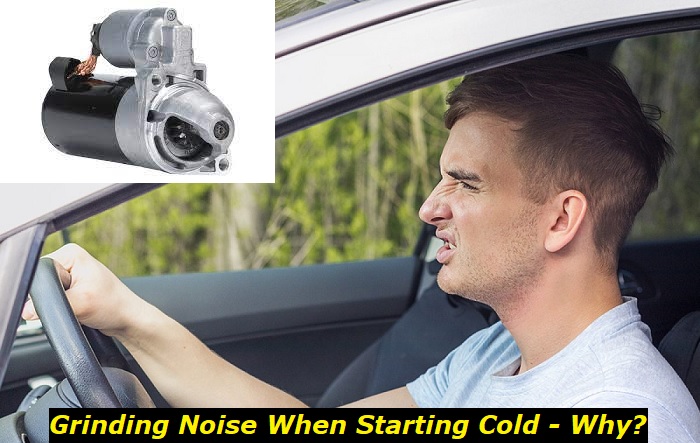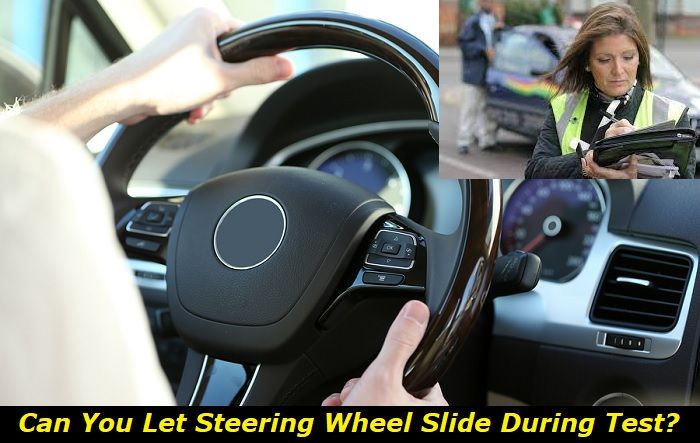When you turn on or press the ignition on a cold morning, the vehicle might fail to start. A lot of people blame the battery whenever their cars fail to start. But in our case, the car can start on the first or second trial while still making a grinding noise. This problem will mostly happen on a cold day and not during summer.
Starting engine noises highlights
- Level of urgency:High
- Can you drive?Mostly, yes
- DIY inspection:Almost impossible
- DIY repair:Impossible
- Price for repair:$250 - $900
- Common Reasons:Starter, flywheel, engine problems, belts, pulleys
- Ways to fix:Inspect everything that rotates when starting the car, replace the broken units

What causes the grinding noise?
The starting of your car involves several parts to come into play. You start by turning the ignition key or pushing the start button, which starts the ignition process. It is important to note the different noises and sounds your car makes or can make when starting the engine. You should rule out a dead battery if you can hear a grinding noise on turning the key. This helps you avoid misdiagnosing and wasting money and time. A dead or dying battery usually gives a ticking sound.
A faulty starter usually causes a grinding noise. The starter has several mechanical parts that have to work optimally for the engine to start. At times, a defective starter can still start the engine. A grinding noise can signal that the starter is malfunctioning, and even though the engine can start, the problem will worsen to a point where the car won't start.
To understand the grinding noise when you start the car cold, we must look at how the starter works. This way, you will always have an easier time diagnosing starter problems.
How does a car starter work?
In the olden days, drivers of motor vehicles used starter rods to start the engine. This technology is still used on some lawnmowers, speed boats, and water pumps, where you must pull a short rope to rotate the crankshaft. As technology grew, however, the starter rods were replaced with the starters we have today.
The starter is a small yet very powerful component that starts the engine. It is powered by the car battery. Because the starter requires a lot of current, a solenoid is added to it to help charge the motor. The negative battery wire goes to the solenoid, while the positive wire goes to a contactor next to the solenoid.
When you turn the ignition key, the circuit is completed and the solenoid is charged. The plunger will then slide out of the solenoid and give the motor a powerful current jolt which makes the motor rotate. As the plunger slides out on one end of the solenoid, it pulls a pulley on the other end, which is connected to the pinion gear. This allows the pinion gear to slide outward on its axis and engage with the flywheel before the motor can start to rotate.
Once the flywheel is engaged, the crankshaft starts rotating and the engine starts. It is dangerous for the pinion gear and the flywheel to remain engaged once the engine starts running, as this will damage the starter. On the other hand, the motor should stop rotating once it has achieved its goal of powering the flywheel. Here, the driver's input is required when they are required to release the ignition key. This act disengages the battery from the solenoid and resets the plunger and the pinion gear to their default state.
The grinding noise when starting the car
A grinding noise can be heard when the starter's pinion gear fails to engage with the flywheel's ring gear properly. The same noise will be made when the pinion gear fails to disengage properly. Even if the solenoid is the one malfunctioning, the grinding noise will mainly come from the gears not properly engaging or disengaging.
A bad solenoid can cause a grinding noise when it is unable to pull back the pinion gear all the way back. This will leave the gear slightly engaged to the flywheel. Since the flywheel is now rotating much faster than the starter gear, the cogs will grind. Failure to disengage from the flywheel will cause the pinion gear to back-drive the motor, damaging the starter. This is why the driver should release the ignition key. However, a one-way clutch has been installed in the starter to prevent back-drive risk.
The problem can worsen when it's cold. When metal parts are subjected to cold, they shrink. This can compound problems for an already faulty starter. The metal parts of such a starter will shrink, making the pinion gear unable to smoothly slide back on its helical slide.
Other causes of grinding noise when starting cold
1) A faulty Bendix clutch
The Bendix clutch, a one-way clutch found in the clutch, can also cause a grinding noise when starting your car. The problem is usually experienced after you replace the clutch in your car. For a manual transmission vehicle, the clutch is replaced once in a while to ensure the engine and the transmission engage smoothly. The dust from the old clutch can contaminate the Bendix clutch, and this can cause the starter to make a grinding noise. The issue solves itself over before long.
2) A bad flywheel or flexplate
The flywheel engages with the pinion gear to start the engine. As you may be well aware, the flywheel or flexplate of your car has teeth all around it, and none should be broken. If a cog on the flywheel is broken, a grinding noise will be made when you turn on the ignition key.
It is important to note that the noise will be intermittent because it will be pronounced only when the pinion gear engages with the damaged section of the flywheel. This noise might coincide with a cold morning; given that it is made intermittently. This can cause further damage to the flywheel and the starter if the issue is not addressed in time.
How to fix the grinding noise
The solution to a grinding problem will depend on what is causing it. The answer can be easy and cheap, but in some cases, it can be time-consuming and expensive.
- Repairing the starter
The grinding problem caused by a faulty starter will most likely originate from a defective solenoid. Suppose the solenoid cannot pull back the pinion gear or disengage it from the flywheel. To repair such a solenoid, you will need to remove and disassemble the starter to have access to the solenoid. Seek professional help if you suspect the starter is the issue. Such a job will not cost you much, and it will take a professional around 4 hours.
- Replace the starter
The starter has several moving components that wear and tear over time. The starter can malfunction in such a way that it cannot be repaired. If the grinding noise is because the pinion gear cannot return to its chamber smoothly, you should replace the starter.
- Replace the flywheel or flexplate
Damage to the flywheel will mean the entire flywheel must be replaced. The replacement process is time-consuming, and an expert should do it. While working on replacing the flywheel, it is imperative that you get the right one and install it correctly. This procedure is more expensive as there is also a good chance the starter might be damaged too.
How risky is it to ignore the grinding noise?
A grinding noise when you are starting your car can be a minor issue. It might be that the solenoid is malfunctioning, and repairing it will solve the problem. The issue might be a stuck pinion gear that has encountered some blockage along its helical axis.
In many instances, however, drivers tend to ignore the noise, especially if it happens intermittently. Failure to address the issue early enough might cost you an entire transmission and ignition system. Even if the problem is intermittent, ensure that an expert looks at it soon because it can cost you thousands of dollars later.
Conclusion
There are many reasons why your car can make a grinding noise when starting cold. It is important to rule out things such as the water pump, power steering pump, alternator, or battery. These are the parts that are likely to make a grinding noise. However, they mostly don't make the noise at the point of starting the engine.
By ruling out other noises and possible causes, you will quickly conclude that the grinding noise most likely comes from the starter. As stated earlier, the earlier you are able to solve this noise issue, the better it will be for you. You don't want to get stranded at night because you ignored all the red flags.
About the authors
The CarAraC research team is composed of seasoned auto mechanics and automotive industry professionals, including individuals with advanced degrees and certifications in their field. Our team members boast prestigious credentials, reflecting their extensive knowledge and skills. These qualifications include: IMI: Institute of the Motor Industry, ASE-Certified Master Automobile Technicians; Coventry University, Graduate of MA in Automotive Journalism; Politecnico di Torino, Italy, MS Automotive Engineering; Ss. Cyril and Methodius University in Skopje, Mechanical University in Skopje; TOC Automotive College; DHA Suffa University, Department of Mechanical Engineering






Add comment